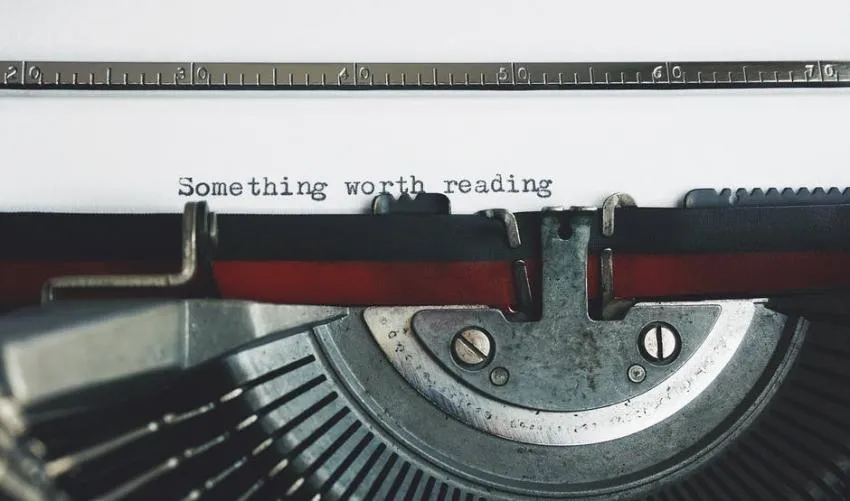The Best 10 Ways You Can Become A Better Writer

Writing is an intimate art form. It relies entirely on the words you use to convey meaning. Whether it's abstract or straight-to-the-point, it's a part of you that you are putting down on paper. It's something that can both be shared with the rest of the world and kept to yourself. There are no limits to what you can do with the written word.
However, it's very common (and even expected!) to feel like you're not 'as good' as you should be. It's intimidating to see so many great works of literature and poetry. You might feel that your work doesn't compare. You might even feel like you shouldn't write anymore. The truth is, everyone can write, but not everyone can write well naturally. There are many ways to improve your writing while also tackling those feelings of defeat.
Here are 10 ways to improve your writing:
1. Read as much as you can

There are so many kinds of books out there, but the ones you like most are the ones most likely to impact your writing - often for the better! When you're reading, you're seeing samples of the author's style. If you like how a specific author writes, read more of their books and figure out what it is that you like about them. Then, simulate it the best way you can. This doesn't mean copying sentences from their work and replacing certain words before slapping them into your own manuscript. Simulation isn't copying; you look at how the author writes and try to imitate it with your own words.
2. Write every day

How can you get better if you don't practice often? Writing, like other skills, can be improved through consistent practice over periods of time. It doesn't even matter if you write a whole novel in 6 months or only one chapter in a week. There is no general measure to progress; for each individual, progress looks different.
A good way to keep up practice is to set a quota per day or per week for how many words you want to write. By doing this, you will keep your skills from deteriorating and maintain a good work schedule for when you start bigger projects.
3. Keep your mind open to inspiration

Aside from writing, the next important thing is the ideas that hold your story together. Sometimes, ideas can just drop into your head randomly and you'll like it enough to try to make it a reality. Other times, you will see another work, or even witness something in life, that inspires you to write about it. Inspiration, along with discipline, is how projects get completed.
4. Don't be afraid of being "unoriginal"

You will hear this all the time. "That book so ripped-off of this other book!" or "It's basically a book version of that movie." In reality, there is nothing original under the sun. Every story you've ever written has been done before in some shape or form. However, it's up to you to make it different. Most novels contain at least one or two popular tropes, and for good reason; they're popular! People will want to read books that contain tropes they know and like.
So the next time you get an idea and realize it might be a little similar to another story, relax. You're not stealing their idea. You just have to make it your own.
5. Save all of your rough drafts

While writing, you might go back over your old writing and immediately hate it upon a second glance. Or, in the most extreme cases, you realize your whole chapter is awfully written and you want to delete it all to start from scratch. However, there's an even better alternative to this: if you really don't want it among the other parts of the project, put it in a separate file and rewrite that segment. Sometimes, you might be working on another project and realize that you can utilize bits of the saved piece for a new project.
Even ideas can be put away for later use. You will write a story and realize that a certain concept or theme doesn't play well with the rest of the dynamic? Then take it out and put it away. Don't delete or throw out anything. They could be the missing piece to the puzzle down the road.
6. Take a break, live a little

It's important to improve, but it's more important to know when to stop for a while. Writing for days on end will only leave you burnt out from writing and make you hate it. Take some time off from your project, maybe for a week, and do other things that you love.
How to know when you need a break? It's when you get easily frustrated from not being able to write what you want. The feelings come to mind, but the words don't. It's natural! Stop, put away your project, and live your life without worrying about it for a while until you're ready to come back.
7. Make a 'soundtrack' for the process!

You can't find the right mood for a specific scene? Or do you not know how to imagine how the music at your character's ball would sound like? A really fun way to make writing more exciting is to make a playlist! First, based on the genre your story is set in, find songs or music genres that fit the overall themes and settings of your work. Who knows, maybe it'll be the soundtrack of your future film-adaptation!
It's also just nice to have a playlist to listen to simply for writing without a specific theme in mind. You can listen to it as you brainstorm on what to write for that day. You can make a playlist of songs that allow you to relax and write peacefully. There are many ways to construct a playlist for writing, so feel free to experiment until you find a set-up that's best for you.
8. Share your work with other writers for critique

Sometimes, if you can't figure out if what you're writing is actually good, you need a second opinion. Critiques are what takes up a large portion of writing communities as it allows writers to gather their projects and share them with fellow writers. This way, you can have mistakes clearly pointed out that you may have missed before and had feedback from potential readers of your work if you were to publish it. If you don't know anyone in-person to help you with this, there are many online communities that you could join to have your work critiqued. Who knows, you may actually become more inspired by knowing others are actively reading and thinking about your work!
9. You don't have to start at chapter 1

Not sure how to begin your story? Does it stop you from getting anything done because you're so worried about it? Or are you impatient and want to start getting to the juicier bits of your story? I'm happy to tell you that there is no requirement to begin right at the beginning of the story -- you could even start at the very end! What matters most is getting your words out. If chapter 1 is stumping you on where to begin, simply move on to chapter 2 or 3 and start writing there.
10. What's your planning style?

To some writers, planning out every single bit of your story is vital to the writing process. Some plan every single character's appearance, every interpersonal connection between characters, and they plan every single plot point to the very end. For these writers, it actually makes the process easier in the long run as they can simply link Point A to Point B and focus purely on the writing and not on what to do next.
Others do away with planning and simply start writing off the top of their heads. To them, planning every moment is daunting and can discourage them from beginning to write. Planning it as they go along can help them think of newer ideas quickly and they can improvise without worrying about its effects on later events. Writers can also combine both styles in any way that suits them, planning with very scant outlines and then improvising with new ideas as they write.
As you move forward
Once you've figured out a way to improve your writing process, it becomes easier and easier to not only increase your output but also to increase the quality of your output. Writing does not require every writer to follow the same routine -- everyone produces their best work in different ways. Some people can write a novel in the notes on their cellphone, and some will only write with pen and paper. Some have ideas drop randomly into their heads, and others base their stories on their life experiences. Some can pump out a whole novel in a month, others take years.
Remember that everyone has their own process and path to follow. Find yours and you will go far in your writing.
Opinions and Perspectives
I love how this article emphasizes that everyone has their own unique writing process. I used to beat myself up for not writing every single day, but now I realize that's okay!
Reading really is the best teacher. I've noticed my writing style has naturally evolved just from consuming more books in my genre
The point about saving rough drafts resonates with me. I once deleted a whole chapter I hated, only to realize later it had some good elements I could have recycled
I disagree about the 'write every day' advice. Some of us have jobs and families. Weekly goals work better for me
That's actually a good point about weekly goals. I've found setting a weekly word count target gives me more flexibility while still maintaining progress
The soundtrack tip is brilliant! I create different playlists for different scenes. Really helps set the mood when writing emotional moments
I've always struggled with feeling unoriginal. It's refreshing to hear that even popular books use common tropes
The advice about not having to start at chapter 1 is game-changing. I was stuck for months until I decided to write the ending first
Anyone else find that taking breaks actually makes their writing better? When I force myself to write daily, the quality suffers
Completely agree about critique groups! My writing improved dramatically once I started sharing it with other writers
I'm curious how others handle inspiration. Do you keep a notebook? Use your phone? I'm always losing great ideas
The planning style section really speaks to me. I tried plotting everything out but it killed my creativity. Now I'm a proud pantser!



